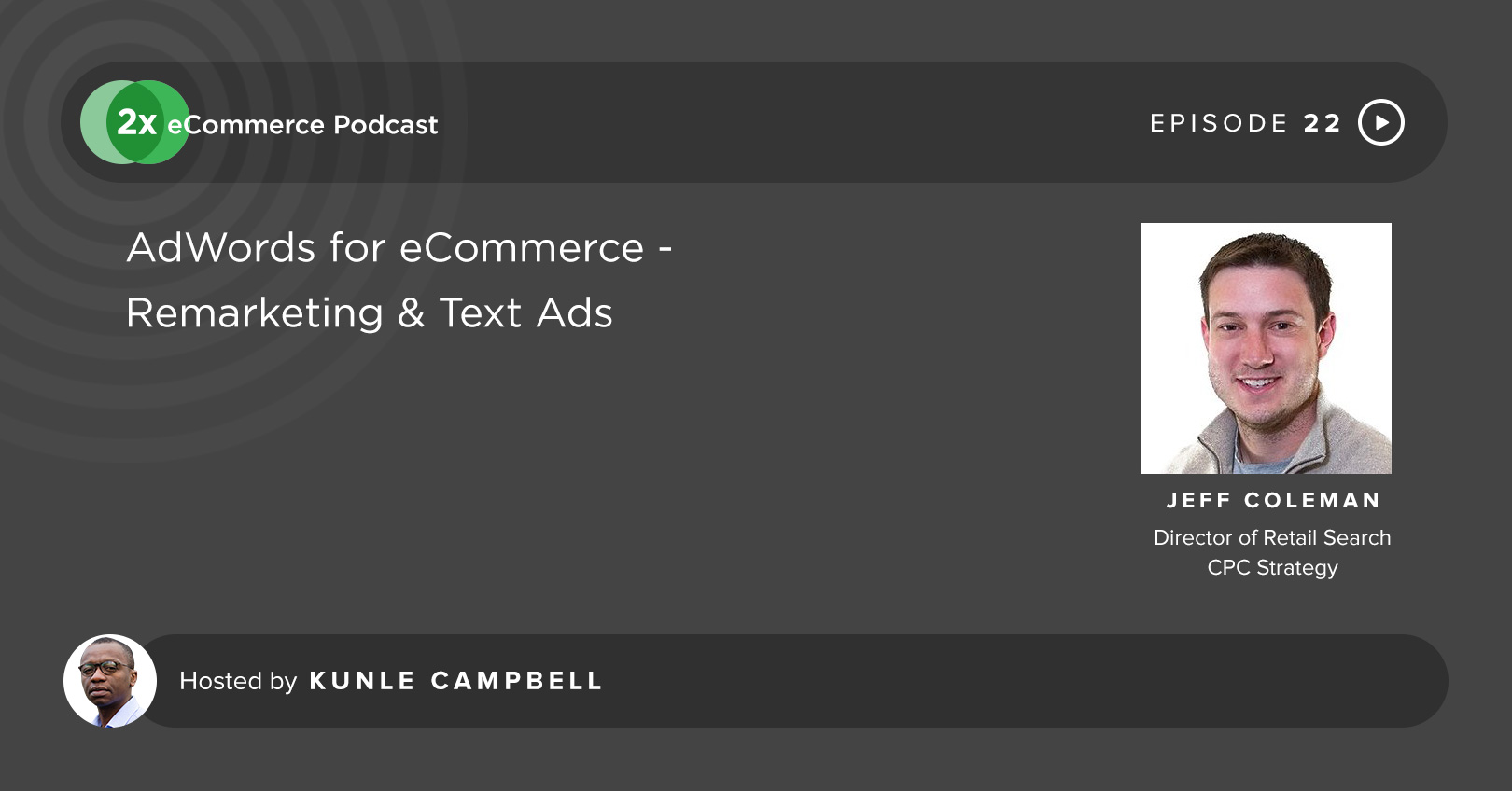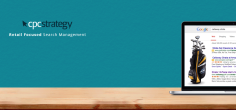
Podcast
Learn from Fast Growing 7-8 Figure Online Retailers and eCommerce Experts
AdWords for eCommerce with CPC Strategy’s Jeff Coleman [PART 2: Remarketing & Text Ads]
This is the second part of my AdWords for eCommerce interview with Jeff Coleman of CPC Strategy – the first episode was dedicated to managing Google Shopping campaigns.
CPC strategy are a well respected paid search management agency with a specialist focus in retail. In this part of the interview, Jeff and I speak in depth about Remarketing, Text Ads, Day to Day Campaign Management and Tools.
Get in touch with CPC Strategy on contact@cpcstrategy.com
Key Takeaways
00.46 – Introduction
01.17 – Explaining the difference in remarketing campaigns
03.28 – How budgets are comprised with in class retail clients
05.01 – Identifying the must have text ad extensions
06.29 – Information on free collection platforms
07.11 – Finding great keyword research tools
10.33 – How to find copy and value proposition in text ads.
16.25 – Common mistakes that retailers make
Tweetables
Make sure you’re looking at like I said at least 30 days worth of data when you’re changing your bids. Don’t panic.
If there’s a term that you don’t wanna show up for at all you can put that in there and Google won’t show your ad.
Transcript
KUNLE: This is the second part of my AdWords for ecommerce interview with Jeff Coleman on CPC Strategy. CPC Strategy is a well respected paid search management agency with special focus in retail. In this part of the interview we’ll speak in depth about remarketing, text ads, day to day campaign management and tools. Remember to grab a pen and paper to take notes.
INTRO: Welcome to the 2XEcommerce podcast show where we interview founders of fast growing seven and eight figure ecommerce businesses and ecommerce experts. They’ll tell their stories, share how they 2X their businesses and inspire you to take action in your own online retail business today. And now here he is the man in the mix Coley Campbell.
KUNLE: Let’s talk about remarketing. Should it occur in AdWords or third party should you sort of manage your marketing campaign on AdWords or would you recommend third party marketing platforms such as Adroll or Criteo.
JEFF: Those other third party platforms sometimes they have other audiences. I think it depends on how hands on you want to be with your remarketing campaign. If you are a retailer that really doesn’t have the time to manage it Adroll, Criteo they offer fully managed solutions so those can be good options. If you have another agency that’s also managing your remarketing or you have the ability to do that you basically should be going directly to the source. Google’s remarketing network is going to cover pretty much every they’re going to be covering every site that you’re going to want to be on so there’s not going to be a whole lot of sites that aren’t in the Googling remarketing network that are worth being on and so typically I recommend just going direct to the source. The tools that they give you are pretty robust. They give you the ability to slice up your audience along demographic lines along the lines of how frequently the customer purchases or when they last purchased, thing like that. You can dictate where you don’t want your ads to show up if you see them showing up in different areas or on a site that doesn’t jibe with your brand. You can customize the formats and things like that. You have a lot of options through the Google interface so if you have the time to do it yourself or if you have another agency that’s managing your paid campaigns for you there’s no reason to add another layer into that when they can go direct to the source. And actually the same thing is starting to be true for Facebook Although it’s not one hundred percent of the way there yet.
KUNLE: I guess you’re not even have a feature such as the RLFS you mentioned earlier with if you’re going to use a third party management tool to manage.
JEFF: That’s a good point. The RLSA has to be set up through the Google UI so you gotta do that through AdWords .
KUNLE: RLSA. Sorry.
JEFF: Oh no worries.
KUNLE: Right. Okay. What about your best in class retail clients. What part of their budgets are they spending on remarketing?
JEFF: It’s usually pretty small. The remarketing list is always going to be limited to the people who have been on your site and so maybe you get a ton of visitors to your site but if you think about the universe of people that have been to your site versus the universe of people that are on Google it’s a much smaller universe. No offense to any retailer out there. That’s pretty much true for everybody so the amount of people that you’re reaching is much smaller and so the budget that you should allocate toward remarketing usually doesn’t exceed ten percent or so of what you would allocate toward shopping. And even that can vary if you have a really small shopping presents. Maybe your remarketing is a bit bigger. The percentage if you have a pretty robust campaign it might be smaller so the main point there though is that remarketing is really not going to drive a ton of volume. It’s more there to capture some existing customers that might have abandoned their cart or maybe to retain customers and stay top of mind but it’s not going to spend a whole ton of money.
KUNLE: Makes a lot of sense. Okay we’re going to move quickly into text ads. Text advertising. This is probably in the same structure [inaudible] the amount of time we’re spending per section is probably insane now.
[laughs]
KUNLE: So in regards to text ads what are your must have text ad extensions? We will go into the fundamentals of text ads ‘cause mostly our listeners will have text ads running anyway so what are the most have ad extensions?
JEFF: Honestly every single one of them.
[laughs]
KUNLE: Okay. Next question.
JEFF: Exactly. But just real quick the reason being the more extensions you can have the longer your ad is on the serp and the more chances a customer has to click on your ad. Google likes it. It takes up more real estate. Enable every one that you possibly can.
KUNLE: I can’t remember who said this [inaudible] referred to extensions add weeks to your ads.
JEFF: Yeah.
KUNLE: And how ever many there are the better. What about seller reviews? That social [inaudible] psychology has seen track record for your best in class clients. My question is what are the most effective platforms? What platforms should you just say ‘you know what?’ For a first time retailer going into about to sell up for a seller review program what platforms would you recommend?
JEFF: This is also changed a bit over the past couple months. At this point I wouldn’t necessarily recommend a Google Trusted Stores as one to start out with in the past just because it used to be a lot more complicated to sign up but they’ve made it a lot easier. All you have to do is install a few lines of code which might be difficult but every review question software is going to ask you to install something. And so given that Google Trusted Stores is Google’s own review collection platform I’m always going to recommend that one plus it’s free. There’s no subscription. So I would say if you’re looking to start out that’s a great one to start using. There’s a number of other services out there just off the some that are clients I use frequently. And shopper approved they’re a good collection company. Another one called Yotpo. Those are probably two of the most common ones that our clients use. So if you’re looking for another option outside of Google Trust It Stores I would say start with those two.
KUNLE: Shopper approved and Yotpo. Nice. I’ve come across both. Okay, let’s talk about keyword research. What are your best tools for keyword research?
JEFF: I would say first and foremost most retailers are going to have some sort of campaign built out already. Use your own data. It sounds basic and I’ll give another couple suggestions to you but a lot of times retailers ignore their own customer search term data. Those reports are really valuable in telling you what your customers are searching for and also a lot of the times the purpose of the keyword research is to see what terms you could stand to get some visibility on and you could afford to get more visibility on. Your own core data is going to be the best source of that because that’s going to give you actual conversion rates. So start there. A lot of retailers overlook it. Some other competitive analysis tools that you can use, tools like SEMRush is a good one. SpyFu is another good one. It’s important to keep in mind though that the data that those tools might be collecting on your competitors can be estimated so we use them on our side so use them but use them with a grain of salt.
KUNLE: I heard a client of mine was complaining about the data in SEMRush. They were trying to get estimates on the project. They managed the PPC campaigns in house and they were trying to run a competitor analysis against, really trying to find out how their competitors were spending and the estimates in SEM were nowhere close to what they spend and so they took it with a pinch of salt. However they’re always spot on with keywords. My question has to do with are there any platforms to accurately get competitor spend?
JEFF: There really aren’t and you can kind of guess why. There’s so much that goes into what Google actually charges someone for a particular search. And there are so many possible searches that a retailer might be showing up for at any given moment. It’s really difficult for any outside company to estimate how much someone is spending and so if you want to use the tool for that purpose you’re probably going to fail. But like you said those tools can be really good for understanding where your competitors are showing up, what terms they’re showing up for, where there competing against you. And you can start to see does it make sense for me to engage in that type of bidding war or does it make sense for me to kind of stay out of it. And even if they could estimate what a competitor is spending they’re not going to be able to have any clue if that’s a profitable search. We see all the time that retailers want to rank really well for a search to keep the footprint if if it’s a loss leader so don’t always assume that because your competitor is doing that, that they’re making money on it. They might just want to push you out.
KUNLE: Exactly. Test. Awesome. This is really good stuff Jeff. What about copy and value propositions in text advertising. How important is copy and value proposition in text ads and how would you go about putting copy and value proposition in your text ads?
JEFF: It’s definitely always important. There’s a lot of rules of thumb around copyrighting and I’m sure your listeners have done that research but you always want to have a call to action. You always want to have a value prop in your ad copy. The rule of thumb that we always try and stick to as well is you always want to have two ads running at the same time that are competing with each other. So you never declare a winner and then just let it run. Always be testing and when you’re testing things don’t test a completely new ad. Keep everything the same but change one little thing. So if you’re going to change your call to action in the headline from buy mens jeans on levi dot com to levis jeans for sale. Things like that. If you’re going to do that keep your description lines the same. Keep your display URL the same. Keep your site links the same. Keep everything the same just test that one portion of your ad copy and that’ll tell you if its effective or not.
KUNLE: It’s just like AB split testing the conversion rates optimisation. Fantastic. Good stuff. Big question a lot of retailers, a lot of listeners would have is some of them might be competing with Amazon. How do you outbid and outperform Amazon in text ads?
JEFF: We get that question a fair amount too and really I would say don’t worry about it. You’re going to see Amazon ranking and no offense to any listeners out there but I would bet that Amazon probably has a better conversion rate. And that’s just because A the brand new but B because prime customers tend to be some of the most loyal customers on the Internet and there’s a ton of research to support that. But don’t get in a bidding war with Amazon. If you go up against them and you’re able to take the top spot and they come back over the top of you in they’re ranking first that’s not a war you’re going to win so I would almost sort of ignore Amazon when it comes to bidding on text ads. The nice thing is that they’re not going to be in the Google Shopping results so you’ll never have to compete with them there.
KUNLE: Why are they not active on Google Shopping and PLA?
JEFF: Basically because Google doesn’t want them there.
KUNLE: So Google has put a ban on them or
JEFF: You know actually part of their requirements, part of their policy is market places are not allowed on Google Shopping and you can [inaudible] through their targeting mainly eBay and Amazon but basically they don’t want them there. They don’t want to support Amazon as the place to go to look for products. Google wants people to go to Google Shopping to look for products and so
KUNLE: I guess it democratized search. That’s fair. That’s actually really fair in terms of the rest of the market.
JEFF: Yeah and on the same token Amazon actually pulled off of Google when it went paid. They don’t want to support Google to be the place to go so they both have the same interests in mind.
KUNLE: Okay just one final question on text ads. Would you recommend those automatic ads for our listeners who are not aware of key what insertion ads. They’re actually powered by what you search for so if you search for blue or black pair of jeans it would just turn up on the item or copy of the ad or in the headline. Would you recommend automating your copy that way?
JEFF: Yeah I typically recommend running that as again you could have a split test. I wouldn’t say for all of your ads use the abbreviations DKI so if you don’t see key word insertion you’ll see DKI if you’re searching for how to do that. But I would recommend. We talked about having two ads running so you could AB test them. Test one that has DKI in it. Test one that doesn’t that you’re manipulating and yeah I definitely would recommend utilizing it. Basically what it’ll do is if the customer types in a search term that triggers one of your key words that you’re bidding on it will pull the key word into your ad copy. It won’t necessarily pull the customer’s search term but it pulls the key word you’re bidding on and it actually allows you to have a longer ad too. We see oftentimes in practice that character restrictions that Google places on ad copy, they won’t adhere to as much in the DKI ads and so you can have a longer ad. Also the key word will tend to match a little bit what the customers search for so you get to some extra bolding in there. It can be a more compelling ad so I would definitely recommend testing it out but always keep one ad that doesn’t have it that you’re manually updating that you can say hey let me test some things with this ad copy.
KUNLE: The final stage of this interview, day to day campaign management. How should we tell as manager the ad words campaigns on a daily basis?
JEFF: So it kind of depends on [inaudible] I’ll start with the shopping campaigns but on a daily basis you’re going to wanna, the most important thing is going to look into your product group bids and how they’re performing and you’re going to want to make sure that you’re looking at how to adjust them but based on performance. But also make sure that you’re looking at a long enough day range. Typically we’ll look at at least thirty days of data so even if you’re logging in every day that might not be a whole lot that’s changing on a long term basis and so sometimes these should be bi weekly or even weekly adjustments. But make sure you’re looking at a long enough range. That’s also a common mistake that we see retailers make is that they’ll log in and see hey Saturday was pretty crappy I need to cut my bids in half. No matter Saturday was just a slow day or maybe it was a holiday. Don’t overreact. Make sure you’re looking at like I said at least 30 days worth of data when you’re changing your bids. Don’t panic. That’s going to be the most important thing. You can also look at your search term reports on Google Shopping. Go to see what terms you can ad in your titles and descriptions but also to put into some negative keywords for Google Shopping as well if there’s term that are completely irrelevant that you’re showing up for. So that can be important to look at as well.
KUNLE: And I guess you could also see the keywords attracting clicks from your product listings ads anyway from your reports.
JEFF: And like I said earlier you can’t bid on keywords for Google Shopping but you can bid negative keywords so if there’s a term that you don’t want to show up for at all you can put that in there and Google won’t show your ad.
KUNLE: Okay. What metrics demonstrate the health of your campaign?
JEFF: So this is an important question that we will always start off with our clients. Everyone wants to be successful. They want more volume. You want a better ROI but the most important thing for you as a retailer to understand is what the primary goal of the campaign is and this can vary so there’s no real right answer to this. If the primary goal is to grow order volume then really you’re going to want to be looking at conversion rates and order volume essentially. If you have to make sure that you’re sticking in a particular ROI or your boss is going to chew you out you’re going to want to look at CPA. You’re going to want to look ROAS and you’re also going to want to keep on top of your profit levels. Oftentimes it’s easy to say hey my break even point is twenty five percent margin and so you want to be above that or that would correlate to a four to one ROAS. But you also want to look at how profit is changing over time and if you implement a bid increase and maybe that leads to growth and order volume but if it leads to a decrease in profit maybe that wasn’t necessarily a good move for you to make. And so keep that in mind if you’re using Google Shopping as a primary source of your volume chances are you need it to be profitable and you’re going to need to stick to a ROAS goal and you’re going to need to monitor that profit over time to make sure the changes you’re making are leading to more profit. If you have a pretty well diversified marketing portfolio and shopping is one element then oftentimes you can be a little bit more comfortable with maybe a break even campaign and can go after order volume knowing that you’re building your customer base. You can bring those customers back and you can be able to be a little bit more liberal with your ad spent.
KUNLE: What about another question I had in regards to day to day campaign management are the tools Google offers sufficient enough for day to day management or would you highly recommend third party tools?
JEFF: No they’re pretty robust. Like I said we built our own technology in house to handle a lot of the reporting and the day to day management but a lot of what our tool and the other tools out there are doing are making the reports easier to read or automating some of the tasks. The tools that Google gives you within the ad words UI are really robust. So they’re going to give you reports on especially for shopping and text ads. They’re going to give you reports on any dimension that you could possibly want. They’re going to give you the ability to customize your ads pretty much any way that you want and things like that so the tools that they give you are oftentimes robust. Sometimes the difficulty is knowing where to get them and how to use them and that’s sometimes what the third party tools make a little bit easier is how to find all of this information. How to use it. But the tools that are in there are robust and like I said that’s a great place to go.
KUNLE: What about Excel? How important is it? I recall a few years ago I attended a webinar and they were like Excel is a PPC manager’s best friend. Is that still true?
JEFF: I would say so yeah. We use it pretty heavily. Any reports that we’re going to export either from our platform or from Google directly are going to be in a csv format or going to be in Excel format. And you want to be able to filter your performance. You want to be able to sort you want to be able to run pivot tables along different brands or different buckets and things like that. And even within the text ad program if you’re creating ads in mass a lot of the time it’s much easier to do that within Excel and then upload them in bulk to the AdWords editor if that’s what you’re doing. And so yeah Excel can be very important.
KUNLE: Right. Okay. Let’s wrap this up. Are there any tools, books or resources that you recommend? Store owners looking to learn more about AdWords particularly into retail. You guys offer fantastic resources so guys if you’re listening to this first part is called CPC Strategy dot com. Fantastic wide papers. I just signed up for your Facebook for dynamic ads and webinar. Other than your websites are there any other books that game changing books and resources that you’d recommend?
JEFF: Yeah I’m glad you threw our website out there. We’ve got a lot of free content so definitely check that out but Google actually themselves they provide a lot of insight into how to do certain things. The AdWords Learning Center is a pretty robust tool. It’s not necessarily going to give you a whole lot of strategy advice but it’ll tell you how to build out all the things that you might want to do so if you figure I want to do this with my ad or I want to build out this type of campaign how do I do that, go to the AdWords Learning Center. And you just Google that and that’ll tell you how to do it. A lot of the time there’s instructional videos on how to create some of those things. There’s also another really good site called think with Google dot com that will have different tips and tricks on how to build out certain campaigns. How to understand attribution models and things like that too so those can be some good resources as well.
KUNLE: Before you say good bye could you give our listeners one parting piece of advice towards managing their AdWords campaign to profitability?
JEFF: Yeah the main two things that I always tell our clients to do is follow the data. Again you don’t want to pull in data from other channels other sources from your site to really guide strategy. You want to take a channel specific approach and even a campaign specific approach and don’t get to tied to a particular strategy. If it’s not working move on. Always be testing. With text ads that means testing ad copy testing keyword bids. Even testing structure. With Google Shopping that would mean testing out pushing the boundaries on your bids for particular products. Restructuring your campaign along different product lines. Testing out new titles. Testing out new descriptions. Always be testing but don’t do things just for the sake of doing them. Run a test and run only that test so that there’s not conflicting variables or things like that. But yeah the two biggest pieces of advice that I would have would be follow the data and always be testing.
KUNLE: Follow the data and test. Finally what’s the best way for listeners to get in touch with you if they wanted to ask you more questions?
JEFF: Yeah. Absolutely. So you can reach out to use at contact at CPC strategy dot com and if you have more questions about anything that I talked about I’ll be fielding those questions there.
KUNLE: Fantastic. It has been an absolute pleasure having you on the show Jeff. Thank you for sharing your insights on Google AdWords for ecommerce.
JEFF: Yeah, thank you very much for having me. I appreciate it.
MALE SPEAKER 2: Thanks for listening to this episode of two ex ecommerce. To help you get more actionable insights and ecommerce growth hacks that’ll help you two ex your online retail business hop over to two ex ecommerce dot com. It’s a blog dedicated to ecommerce and multi channel marketing run by the show’s host Coley Campbell. Two ex ecommerce dot com is packed full of articles and guides to help increase traffic to your store increase repeat purchases and average order value. Thanks for listening. Visit two ex ecommerce dot com.
[End of Recorded Material]




![AdWords for eCommerce with CPC Strategy – Jeff Coleman [PART 1: Google Shopping]](https://2xecommerce.com/wp-content/uploads/2015/06/Coverpage-AdWords-for-eCommerce-Jeff-Coleman-CPC-Strategy-236x110.jpg)

